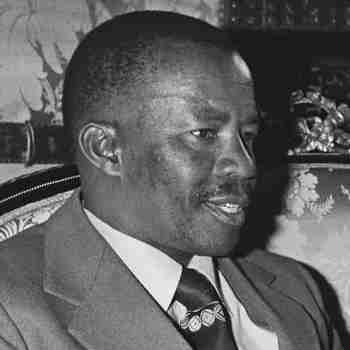DOCTOR OF LAW (HONORIS CAUSA)

Sir Ketumile Joni Masire has made a significant contribution to the African continent, and to southern Africa in particular, both through his role in the development of Botswana, and through his regional peace-keeping activities.
President of Botswana for 18 years, Sir Ketumile led a country that was the world’s fastest growing economy for 15 years, from 1975 to 1990. When then US President Bill Clinton visited Botswana shortly before Sir Ketumile’s retirement in 1998, he praised the country as an “inspiration” that exemplified the democratic and prosperous “new Africa”.
Both during his term as President and since his retirement, Sir Ketumile has played an important role in regional and international politics. He has recently been re-called to the Democratic Republic of Congo to resume his role as facilitator of the inter-Congolese National Dialogue, which aims to achieve peace and a new political dispensation in that strife-torn country.
Sir Ketumile was born in 1925 at Kanye in the Southern District of Botswana. He trained as a teacher in 1949 and started the Seepapitso Secondary School the following year. His career turned to farming in 1956 and then to journalism as a reporter for the African Echo newspaper in 1958. His long involvement in politics began the same year when he served as a member of the Bangwaketse Tribal Council. He was elected to the Legislative Council in 1961 and was appointed to the Executive Council.
As a close associate of nationalist leader Sir Seretse Khama, later to become independent Botswana’s first President, he was a founding member of the Bechuanaland Democratic Party in 1962. Later renamed the Botswana Democratic Party, the BDP was formed to campaign for full independence and an African majority in the Legislative Council on the basis of one person-one vote. As BDP secretary-general, Sir Ketumile played an important part in the negotiations for independence, and was re-elected in the first general elections under universal suffrage in 1965. He was then appointed Deputy Prime Minister and, a year later, also Minister of Finance.
He was appointed Vice-President on independence in 1966. A year later, he took charge of the newly-created Ministry of Development Planning, enabling him to begin implementing a programme for faster Africanisation in the public sector, and was later made Minister of Finance as well. Sir Ketumile was sworn in as Botswana’s second President in 1980, following the death of Sir Seretse Khama.
Diamonds were found under the sands of the Kalahari a year after independence. Although efforts have been made to diversify the economy, diamonds remain the country’s prime source of wealth and Botswana ranks as the world’s largest diamond producer. Testimony to Sir Ketumile’s attempts to ensure that the country was not solely reliant on diamonds, was the awarding in 1998 of the Africa Prize for Leadership for the Sustainable End of Hunger, in recognition of his commitment to agriculture in Botswana.
His reputation as the architect of Botswana’s development was forged in his early years as Minister of Finance under Sir Seretse Khama. He led the transformation of Botswana from barren land into a country boasting 18 000km of tar roads, a network of schools and clinics, a university with some 500 lecturers, an entrenched multi-party democracy, substantial foreign reserves, negligible external debt and steady economic growth.
As President of Botswana, Sir Ketumile continued his country’s opposition to apartheid in South Africa and provided support and shelter to the liberation movements. This resulted in periodic armed attacks on Botswana, but he maintained his refusal to sign a security pact with the apartheid government.
Consistently opposed to tribal politics, he tried to mend tribal divisions in his own country – a role he now echoes in the Congo.
Prior to this, his involvement in regional and international affairs has included chairing the Southern Africa Development Community (SADC) and serving in 1991 as First Vice-Chairman of the Organisation of African Unity (OAU). He currently co-chairs the Global Coalition for Africa.
Sir Ketumile was chairman of the International Panel of Eminent Personalities of the OAU, which investigated the 1994 genocide in Rwanda and the surrounding events in the Great Lakes region.
Since his retirement, he has returned to farming and has continued his humanitarian activities. He led the Commonwealth Observer Group to Nigeria’s National Assembly and Presidential elections in February 1999, and co-led the Carter Centre Observer Group, with former US President Jimmy Carter, to the 1999 Mozambique elections.
His work has been recognised with awards including Swaziland’s Grand Counsellor of the Royal Order of Sobhuza II in 1989, the Honorary Knighthood of the Grand Cross of St Michael and St George in the UK in 1991, and the Order of the Welwitschia from Namibia in 1995.
The University of Port Elizabeth is the first African university to award an honorary doctorate to Sir Ketumile. The degree is awarded in recognition of his outstanding contribution to peace, democracy and stability in his own country and in the greater southern African region.